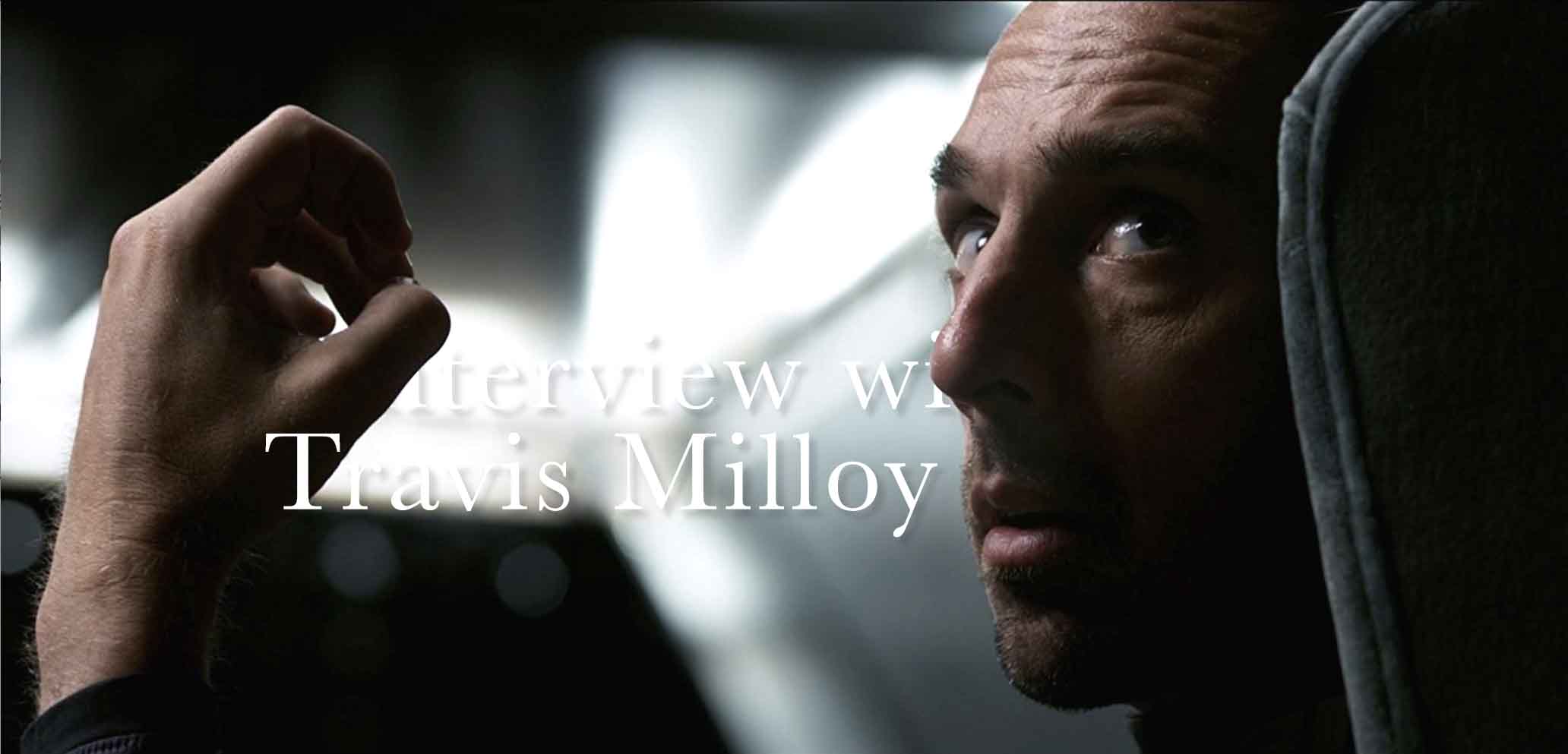This little hobby of mine makes me giggle sometimes. The other day, the famed, the illustrious, screenplay author and director of Infinity Chamber and the screenplay author of Pandorum, Travis Milloy emailed to say thanks for the write up I’d done of Infinity Chamber. So obviously I went nuts, and begged him for an interview. He, unlike me, was totally cool and was kind enough to agree. It was a really fantastic chat that I’m sure you’ll get a kick out of if you even half as big a fan of independent film making as I am.
Now, please know, if you haven’t seen Infinity Chamber, or Pandorum, there are heavy spoilers for both movies here. So, first, I recommend you check out his movies. You can watch both Infinity Chamber and Pandorum on Netflix, so what are you waiting for? Ok, great. With that little bit of house cleaning out of the way, let’s jump straight into the interview, shall we?
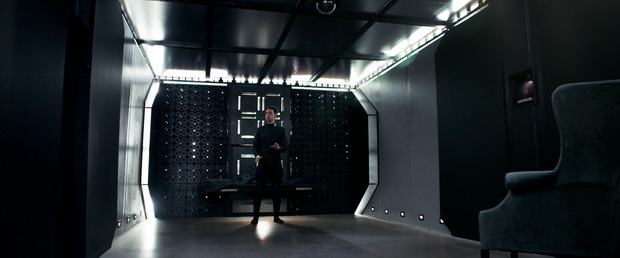
THiNC. – “The idea of Infinity chamber is genius within geniusness. Where/when did the epiphany come from? Was it contingent on the closed box and the idea arose from the practical reality of funding? “Self, I have $12 to make a movie… what could I do what could I do?” Or was it more of a free form, fully functional idea that hit you and you scaled it from there. (I guess truth be told, you did leave the box, some… so there’s that.)”
Travis Milloy – “Thanks so much, appreciate it. Yes, I was looking for a story that would be easy to produce, self contained, low number of actors, etc. I’ve been in Hollywood long enough to know getting a film financed is not easy so I decided to go shoot something that I literally could do for next to nothing, knowing I would have to rely on character conflict rather than spectacle, I’d have to go inward, not outward.
“I also knew that film making is something that’s really easy to procrastinate, to put off until the timing is better. ‘Once I have enough money, once I have enough this or that’ and projects fade from interest, motivation dwindles over time. So I decided to force my own hand in a no going back sense. Once I started writing the script, I rented an industrial space and started building the set myself. I knew that after a few months of spending rent on the space and working so hard to construct something, it would be foolish to not continue. It wouldn’t be so easy to say ‘ah, maybe next year’, the clock was ticking and I was spending money on rent and construction. It took me a year to build the set, working on weekends. I used anything I could find, went to scrap yards, looked through dumpsters and lots of trips to Home Depot. By the time I finished, I had the script, had cast the movie, acquired the crew and had gotten financing. Needless to say, my trick of painting myself into a corner had worked. There was no going back. Sometimes we all need a little secret motivation to take on an endeavor.
“One funny story about the construction of the prison cell, I was looking for an interesting but inexpensive texture for the walls. I tried lots of different things, foam pieces, rubber, glass, etc but nothing was working. Then one day while dumpster diving I found a stack of plastic crates behind a grocery store, used to ship 2-liter soda bottles. I attached a few to the wall and I thought it looked cool, looked futuristic, was interesting with lighting. Great, now all I needed was a few hundred of them. So I drove all around LA looking behind grocery stores for the same crates. I got what I needed but realized that the these weren’t stacked next to the dumpster to be thrown out, the bottling company re-used them and I had inadvertently been stealing property. I was a thief and didn’t even know it. After the movie was finished, I returned them all to the grocery stores where I found them. The store manager probably walked out the next morning and said, “What the fuck? Where did all this come from?”
THiNC. – “Oh wow! That is the funniest thing ever. Wow. You literally built that room all by yourself?!? And with plastic soda bottle crates?!?! And I thought I was clever, dumpster diving for boxes instead of buying them when I moved last! That is so utterly full tilt! I love the determination. I love how you sold out to make this movie. And you wonder why I give guys like yourself a break making shoestring movies? That is fantastic.”
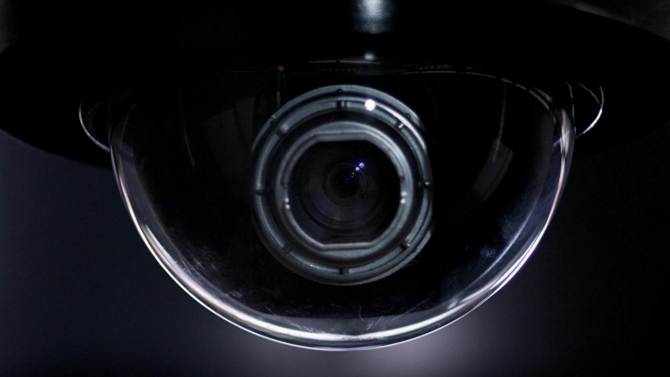
Travis Milloy – “Now, the idea for the story first came to me when I saw a news special on American prisons slowly becoming automated, to cut down on the cost of guards and personnel. I was struck by the notion of an automated prison system and what would happen if something went wrong. That was the hook, and originally it was merely thought of as an escape story but the more I explored it I stumbled upon different elements and interesting themes, and that is our dependence and attachment to technology. We live in an interesting era where machines now dominate and filter our means of communication. And I was struck by the notion of not only our devices being our means of communication but what if it were our only contact. What happens to the human spirit when our only relationships are artificial or synthesized? What are the positives and negatives of this type of relationship? Can a machine replace all of what we gain from human contact, can we feel loved, can we feel a true bond, can we feel true loss when a machine dies? All elements I found fascinating to explore. Originally the script was about an entire cell block, numerous prisoners all dealing with the same problem but I realized it would be easier and simpler to tell a single story, one man talking to one machine.
“Sometimes as a film maker you don’t truly know what your movie’s theme is and that was something I experienced with Infinity Chamber. This started as an escape movie, a movie about redemption and absolution, but while we were making it, the theme began to shift. For me, this is a story about connection, connection to others, connection to the world, connection to artificial relationships. Both Howard and Gabby are filtered and artificial entities that both resolve in similar fashion and the affect these losses have on the human condition. Blah, blah, blah, I feel like I’m getting a bit poetic over what is essentially a genre piece but I do feel strongly that the need for connection, the need for companionship and love lost in unusual forms is the blood line that drove me through the picture.”
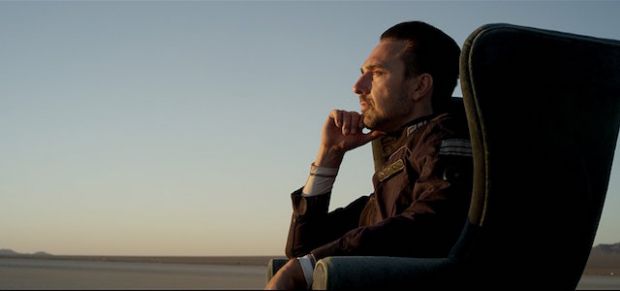
THiNC. – “Christopher Soren Kelly is like a minor deity in the world of small, independent film. His work with Jamin Winans in Ink and Frame was awesome. And his upcoming crowd funded film, The Tangle looks like it will be off the hook. What was it like working with mainly just him for the creation of Infinity Chamber?”
Travis Milloy – “I don’t how else to put it, but I love Christopher. He really was the reason why the whole project took flight. When I was working on the script, I knew I was going to need a very unique talent, someone who was interesting enough to hold the screen by themselves for a majority of the movie. One guy talking to a security camera, I knew I needed someone with an interesting presence, someone interesting to watch do very little, someone who could do a lot with very little. And that was Chris. I talked to him about my idea and he was the first one to say, ‘Just go do it.’ No need to wait for the right timing, the right money, just start making it. Chris is from that world, he produces and directs indie films and he knows better than anyone what is possible with limited resources. There’s a lot of people in this business who can not grasp the idea of making a movie for $100K but Chris knew exactly what I was trying to do. It was the inspiration I needed and with him agreeing to be in it, I had very little hesitation to start the journey.
“He was a joy to work with especially considering our working conditions. This was not your usual production. We had no money for support services, no catering, no dressing rooms, no air conditioning, no luxuries. He was a champ and never hesitated to go the extra mile to get what we needed. I dragged him all over the country, threw him into the Mojave desert where he burned his feet and into 10 below snow covered mountains in the Rockies with nothing but a thin layered space suit! He never gave a single complaint, only a smile and a nod, always believing in what we were doing.
“Performance was something I never had to worry about with Chris, he’s an amazingly talented actor and, believe me, I don’t say that lightly. Performance is everything and honestly it was the least of my concern throughout this production. Chris knew what the role needed, knew what the moments meant and his choices in delivery was a blessing. Over all, we had a very low shooting ratio, we were a run and gun operation so we did very few takes and there was not much left on the cutting room floor. I considered myself extremely lucky to have him be a part of this.”
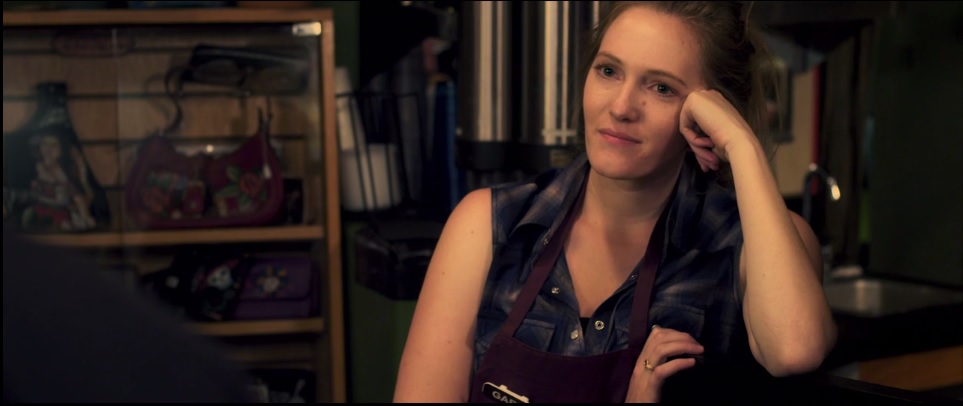
THiNC. – “Definitely think you are right in that Kelly did a great job carrying this story for you. He did a fantastic job. I really loved how your scope went from closed box, to the next cell over, to the coffee shop, to the desert, and all the while we are all wondering what the heck is going on. Most movies that attempt such a finite scope fail at the dialog. How did you avoid the trap of – ‘ok, so um, what do we talk about now Bill? I don’t know Fred.’ I’ll just say this, the pacing was very well done. More well known directors and screenplay writers have failed in this space.”
Travis Milloy – “Well, you’re being very kind and I appreciate it. I knew it was a daunting task to keep people entertained within a limited space and to be honest I believe it worked on an over all basis but there are parts I feel didn’t work, taking the blame solely on myself as a story teller. It’s difficult to gauge, when is it too much and when is it not enough, is this moving or is the audience going to lose interest? I did my best to always have the story propelling forward, from one discovery to another, whether this was small reveals to bigger discoveries. As I said before, this story needed to go inward rather than out, I couldn’t rely on visuals and action to feed the rhythm, I had to use personal obstacles and conflicts as pacing.
“And this is also why I heavily relied on the ability to leave the cell through his memories in order to give us a breath of air and to give us larger landscapes in the outside world along the way. I wasn’t about to attempt an entire movie completely locked in one room or single space, as others have done. It may be considered a ‘closed box” movie as you’ve stated, but I got the luxury of having quite a few other places to escape to (the apartment, the subway, the city, the coffee shop, the desert, the mountains, etc.). It’s a self contained movie in disguise.
“To be honest, the first few edits of the movie didn’t work. The pacing didn’t work. I basically had to change the story and re-invent an opening act in order to get the rhythm and information out in a different form. It took a lot of exploring to get the edit to where I felt it worked. Honestly, I still believe the movie could be shorter and there’s still a few places that I would like to fix in the edit but I think that happens with every film maker. You never feel like you’ve ever finished editing, you just get it taken away from you.”
THiNC. – “But please, please, don’t pull a George Lucas and give us 27 different edits of the same movie! Haha. I talked quite a bit about the various possibilities of what is real and what is not real in my post heralding the greatness that is Infinity Chamber. I had reached out to try and find you, but I either suck at my job, or you are a hermit. hahaha. Do you want to talk at all about the ending of Infinity Chamber? And what really happened? Personally, I think Frank became a barista in the coffee joint and he never left! No seriously, I think Frank is on life support and all of this is just his death throes. yes/no/comments?”
Travis Milloy – “Yeah, that’s an interesting spot of discussion and it garnered much more debate and intrigue than I ever imagined it would. It’s been really fascinating to see fans discuss and debate the ending. Some people have written entire essays on the topic and have developed incredible conspiracies and altered versions of what the ending means. This may sound like a bullshit answer but I swear, my true intentions were to create an ending that allowed the audience to decipher their own meaning and to take the resolution as they believed. Basically, there is enough clues and hints given to guide someone towards a small handful of possibilities but I genuinely wanted people to decide for themselves. I thought this was an interesting choice over clearly dictating the intentions and having some people feel cheated or disappointed. I wanted the audience to have a discussion, for it to live with them after the viewing. Hopefully that is what we accomplished.
“There is the optimistic ending that he did get out and found his way back to a new world and new love, there is the dark version of him never having left the cell but embracing his situation and finding inner peace and love with an artificial entity, and there is the slightly twisted version of a man struggling to detach himself from a life support system that he no longer desires. And there are other fascinating versions that fans have stated and a few of them I thought were better than my own! But honestly, I truly intended it to be personal choice and with that I have my own personal choice of what the ending means. As I told a group of fans who wanted me to settle their debate, ‘Does it really matter which one I choose? All that would do is make half of you feel like they were wrong when for me, there is no wrong, entirely up for interpretation.'”
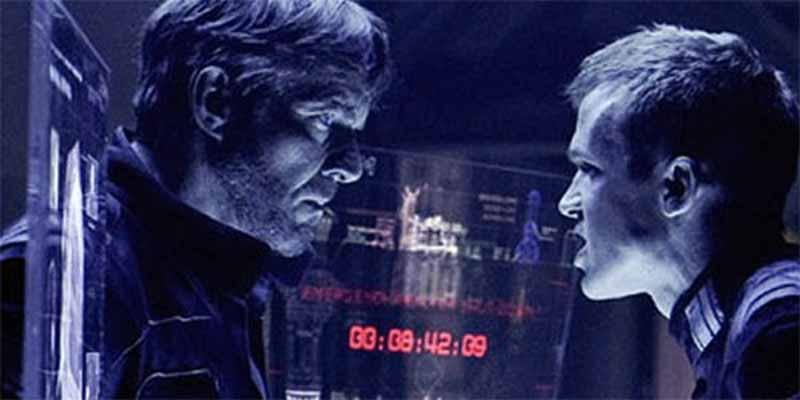
THiNC. – “You also wrote the screenplay for Pandorum, a great indie sci-fi flick with Dennis Quaid, which had a number of really clever twists and turns to it. Where did Pandorum, the space opera idea come from and how did you manage to sell your screenplay?”
Travis Milloy – “Thanks for that, Pandorum is a movie I am real proud of and it was an interesting journey. Originally, I wrote it as a low-budget indie that I was going to direct. It was a Robinson Crusoe in space, one man alone on a giant space ship with nothing but a flashlight. I actually started making that movie, was going to shoot it with my friends in an abandoned paper mill. My manager thought the script was strong and felt it needed to go to the bigger studios to be produced on a higher level. Honestly, at the time, I didn’t have much faith in the Hollywood system, I’d worked on numerous projects for a long time that failed to launch so I was a bit doubtful it would ever get made on the studio level. But my manager refused to quit and got a studio involved and they wanted to do it. Needless to say, I had to stop making my ‘little’ movie and allow the studio to run with it. I had a wonderful time working with Christian Alvart, who directed it and I really thought they did a fantastic job. It was surreal to see the script go to the screen at that level of production.
“From the writer’s perspective, Pandorum was written in an unorthodox way and it changed the way I write scripts. Traditionally you build from an outline, you figure out your structure and story well in advance before diving in but with Pandorum I decided to try something a bit different. I decided to write the script with no idea where it might lead. Man wakes on a spaceship alone, then what? That’s why I incorporated the memory-loss element so that I could essentially put myself in Bower’s shoes, not knowing anything, only wanting to find answers. This is a dangerous way to write because you can easily paint yourself into a corner and run into obstacles that can be hard to solve, etc. But for some reason that process worked on that project. I wrote right up to the ending where Bower finally makes it to the bridge and looks out the windows… not knowing where they are. I didn’t know what I was going to do at this point. I literally stopped mid-sentence. Hmm? What would be interesting? What could be unexpected? I took my dog for a walk to think about it and as I was looking up at the stars, pondering my conclusion, my dog started drinking from a puddle. The water suddenly seemed to be the exact opposite of outer space, that the ship having already arrived and being underwater might be an interesting reveal. So I went home and wrote that. It was an interesting experience and I utilize that technique more and more in everything I write.”
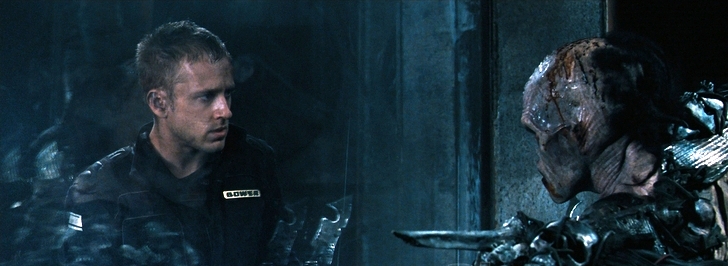
THiNC. – “The Pandorum twist that they had been living under the water for what – generations? – was super clever. I have to give you that. Definitely a really great twist. Where did you come up with the Pandorum induced, Quaid fighting Quaid idea?”
Travis Milloy – “Honestly, I’m not sure how the Quaid fighting Quaid came about. I know I had a character that was stuck in the one room the entire story so I wanted to give him something for an interesting conflict, something to deal with that would reveal itself in an interesting way. Of course it’s not that novel of a concept, used so many times before with Psycho, A Beautiful Mind and Fight Club, but I thought it was an interesting way to reveal who Payton really was.
THiNC. – “I wrote a little story once that I always thought would make the beginnings of a decent low budget screenplay. (https://taylorholmes.com/2014/03/04/silence-post-apocalyptic-short-story/) As an accomplished screenplay writer, what would you recommend to people like me who have no sort of idea how to move that wild idea in their head forward? (Throw away question, what do you do your screenplay writing in?)”
Travis Milloy – “I read your short and I thought it was wonderful. Really well written, intriguing, dark and beautiful. And yes, absolutely, anyway I can help or provide any advice and guidance I can give ya, be more than happy. The first thing I would ask is what is your end game with the project? Is this something you’d want to produce and direct, is this something you would want to sell to a studio, produce with a director, etc? For me, knowing what the end goal is would slightly alter my advice. And this would probably need a longer discussion than I could provide here so anytime you want to jump on the phone, let me know.”
THiNC. – “Do you hear that everyone? Travis and I are now best friends. Hahaha. And will be having weekly beer runs from here on out! Seriously though, you are really too kind sir. I am not you, and couldn’t direct a movie to save my life. My only thought was to draft it as a screenplay just to see how it comes together. Outside of that, no idea! hahaha. Enough about me and my little story! Because seriously, I’m blushing. Anyway. Do you have any projects you are working on? Anything you want to talk about, anything you can share? Do you need a reading group that THiNC. can assist you with your scripts? We charge a very very small fee. Hahaha (I’m only slightly joking!)
Travis Milloy – “I have a handful of projects I’m working on and preparing to do another movie next year. I’m staying in the same space that intrigues me and that is SciFi, low budget, self contained stories. I may take you up on the reading group, would love to hear more about it.”
THiNC. – “Well, we have assisted a couple different screenplay writers with strengthening their scripts over the years. Just accidentally. But yeah, if you have a script you’d like a few of us to read and give feedback? Oh, my gosh, I can promise you that there’d be a pile of us that would be honored to read your stuff and help you out. Bottom line? Dying to see what you bring to the silver screen next!!”
—————–
Well Mr. Milloy – thanks so much for chatting. Thanks for making amazing movies. And thanks for building that set on the off chance that the movie would come together. You did a great job, and your hail Mary worked. Kudos to you. Don’t be a stranger, and let us know if we can help at all. We’d be happy to.
Edited by, CY

